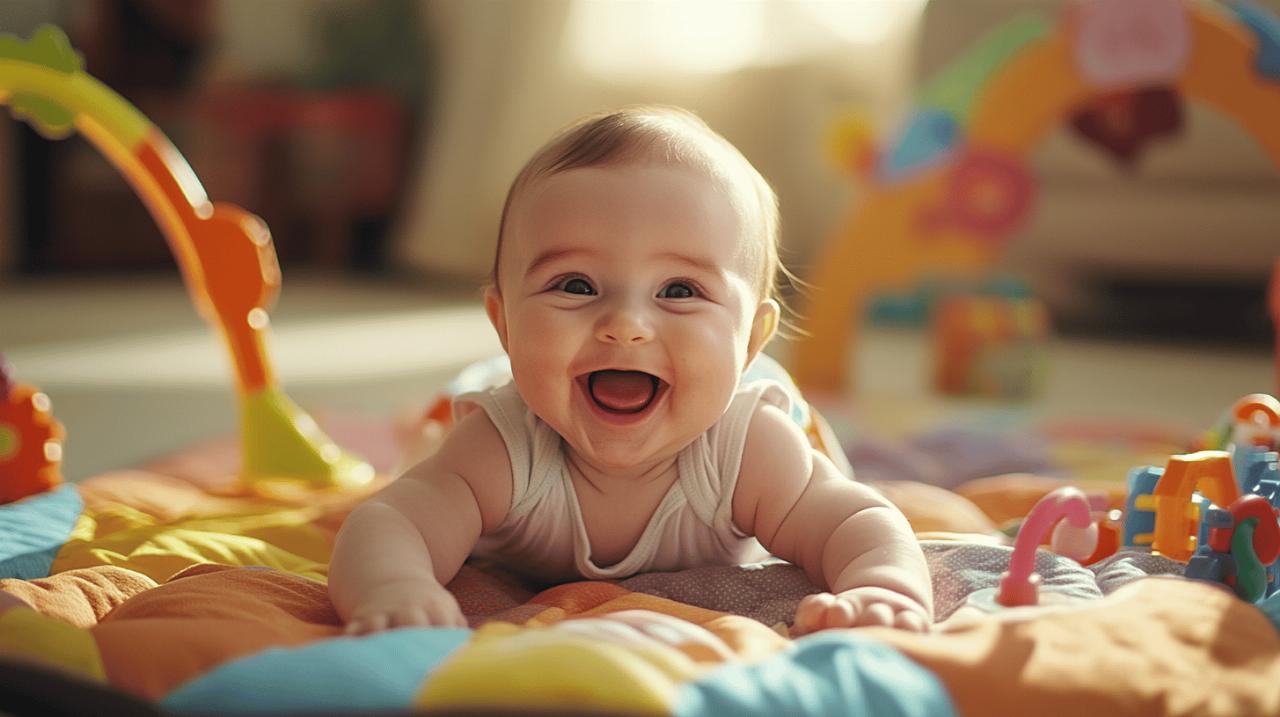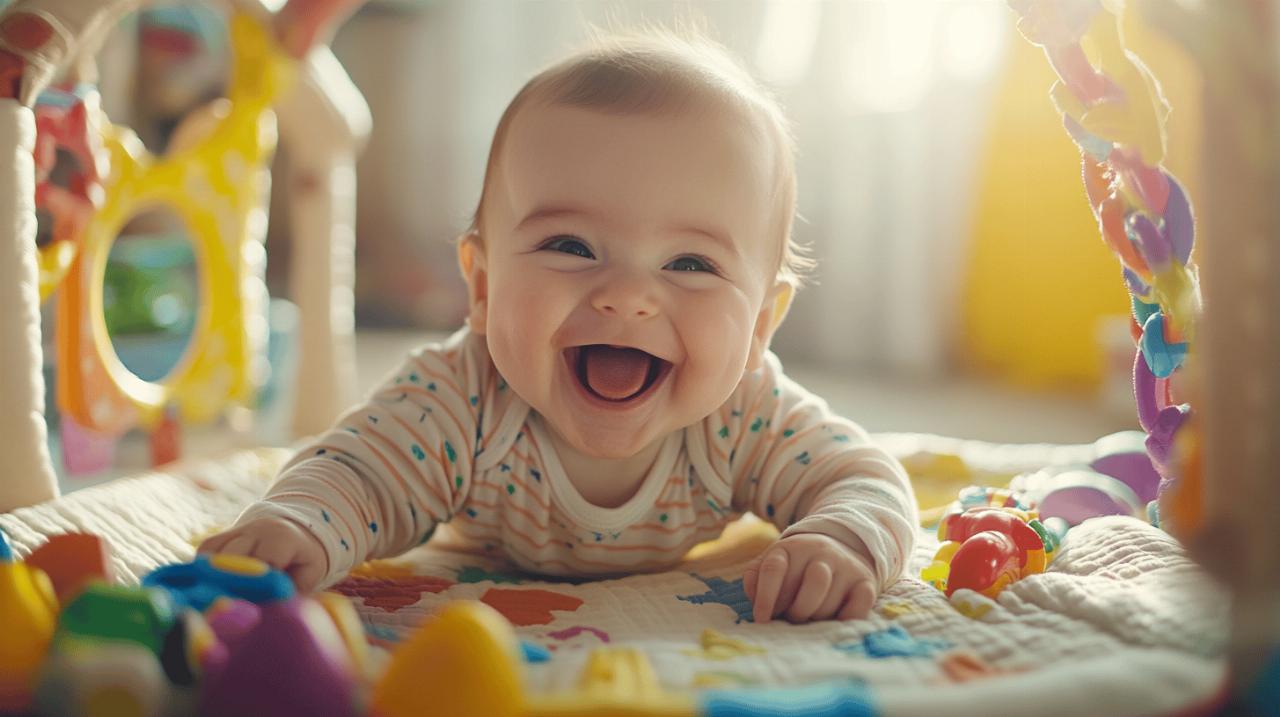The Joy of Development: A quel age les bebes commencent-ils a rire? Discovering What Makes Babies Laugh
When babies begin to laugh: typical development milestones
Babies fill our lives with joy in countless ways, and one of the most heart-warming moments is hearing your little one laugh for the first time. While every baby develops at their own pace, most infants typically begin to have a proper giggle between 3 and 4 months of age. This delightful milestone represents a significant step in their emotional and cognitive development, showing they're starting to engage more deeply with the world around them. Before these first chuckles emerge, your baby will communicate through other means, gradually building their social skills day by day.
From reflex smiles to social grins
The journey to laughter begins with smiles. Newborns may smile in their sleep or when content, but these early expressions are primarily reflexive rather than social. Around 6 to 8 weeks of age, babies typically develop their first genuine 'social smile' – a deliberate response to your face or voice rather than just a random muscle movement. This transition from reflex to social smiling marks an important developmental progression as your baby begins to recognise and respond to familiar faces. These early smiles are the building blocks for more complex emotional expressions, including the giggles and laughter that will soon follow.
The 3-4 month laughing milestone
As your baby approaches the 3 to 4 month mark, you might be treated to those first magical chuckles. Charles Darwin himself noted this development when studying his own son's laughter, documenting its emergence at 113 days. This timing seems consistent across different cultures, with infant laughter typically appearing between 14 to 18 weeks regardless of cultural background. During this period, babies become more responsive to playful interactions like gentle tickling, silly faces, or the classic game of peekaboo. Simple interactions tend to generate the most giggles at this stage, as babies are just beginning to develop their sense of what they find amusing. Remember that some babies might not laugh until around 7 months, which is still within the normal range of development.
The Importance of Baby Laughter in Development
Baby laughter is far more than just an adorable moment for parents to treasure – it represents significant cognitive and emotional development. When your baby laughs, it indicates they're developing the ability to process and respond to social situations, recognise patterns, and experience joy. This seemingly simple expression is connected to sophisticated brain functions, linking to areas associated with emotion and memory. As your baby grows, their laughter evolves from simple responses to increasingly complex cognitive processes, offering a fascinating window into infant cognition and emotional development.
Emotional and social growth indicators
Laughter serves as a powerful indicator that your baby is developing emotionally and socially in a healthy manner. By around 5 months, babies can often distinguish between normal and unusual events, and may laugh at things they find odd or surprising. This demonstrates their growing understanding of how the world works and what constitutes an unexpected deviation. Laughter also functions as what scientists call 'social glue', signalling positive emotions and creating bonds between babies and their caregivers. Through these joyful exchanges, babies learn about social connections and how to engage with others. By 8 months, many infants even engage in 'clowning' behaviour, deliberately trying to make others laugh, showing an emerging awareness of how their actions affect those around them.
Communication through early vocalisations
Before babies develop full-fledged laughter, they communicate through cooing and gurgling noises. These early vocalisations are crucial first attempts at verbal communication. As they progress to laughing, babies are developing more sophisticated ways of expressing themselves and connecting with others. Research suggests that babies laugh far more frequently than adults, using these sounds to maintain engagement and interest from their caregivers. This laughter-based communication helps babies learn about turn-taking in conversation and social reciprocity, foundational skills for later language development. When babies laugh during interactions, they're not just expressing joy – they're actively participating in a social exchange that strengthens neural pathways related to communication.
Encouraging your baby's first giggles
 Creating opportunities for your baby to experience joy doesn't require elaborate plans or expensive toys. Simple, everyday interactions often yield the most genuine laughs. Playing peekaboo, making silly faces, or gently blowing on your baby's tummy can trigger those precious giggles. Interestingly, babies in many countries respond with laughter to peekaboo, suggesting some universal elements to infant humour. Some babies even laugh at unexpected actions like watching paper being torn! The key is to observe what specifically delights your child and follow their lead, as each baby has unique preferences when it comes to what they find amusing.
Creating opportunities for your baby to experience joy doesn't require elaborate plans or expensive toys. Simple, everyday interactions often yield the most genuine laughs. Playing peekaboo, making silly faces, or gently blowing on your baby's tummy can trigger those precious giggles. Interestingly, babies in many countries respond with laughter to peekaboo, suggesting some universal elements to infant humour. Some babies even laugh at unexpected actions like watching paper being torn! The key is to observe what specifically delights your child and follow their lead, as each baby has unique preferences when it comes to what they find amusing.
Playful interactions and bonding activities
The games and activities that make your baby laugh serve a deeper purpose beyond entertainment – they strengthen the crucial bond between you and your little one. When you engage in playful interactions, you're building trust, security, and emotional connection. Teasing behaviours, which babies begin to understand around 6 months, demonstrate their growing awareness of others' minds and intentions. These playful exchanges help babies develop social intelligence and emotional regulation. Activities like pretend play not only generate laughter but also support cognitive development by encouraging imagination and problem-solving. Through these joyful moments, your baby learns that the world is a safe place to explore and that you are a reliable source of comfort and happiness.
Creating the Right Environment for Laughter
Babies are more likely to laugh when they feel secure, comfortable, and well-rested. Ensuring your little one gets adequate sleep, proper nutrition, and regular attention creates the foundation for joyful interactions. Babies need to be in the right mood to laugh – even tickling won't always work if they're tired or hungry. Creating a relaxed atmosphere without too many distractions can help your baby focus on playful exchanges. It's also important to be attentive to your baby's cues and not push for laughter if they seem overwhelmed or disinterested. Allowing your infant to lead these interactions helps them develop confidence and autonomy. When babies feel they have some control over playtime, they're more likely to engage fully and express their natural joyfulness through laughter.
What if my baby isn't laughing yet?
While most babies begin laughing between 3 and 4 months, there's considerable variation in development timelines. Some perfectly healthy babies might not have their first laugh until around 7 months. Development unfolds along a spectrum rather than according to a strict schedule, with each baby progressing at their unique pace. Various factors including temperament, environment, and individual differences all influence when milestones occur. Rather than focusing exclusively on when laughter emerges, it's helpful to look at your baby's overall development patterns across different domains including physical, cognitive, and social skills.
Individual development differences
Babies develop at remarkably different rates, with some reaching certain milestones earlier and others later. A baby who is slower to laugh might be advancing more quickly in other areas like motor skills or visual tracking. Temperament also plays a significant role – some babies are naturally more reserved or observant before expressing themselves through laughter. Cultural differences can influence how and when babies laugh as well, with variations in the types of interactions that adults typically have with infants. The important thing to remember is that development isn't a race, and comparing your baby to others or to rigid timelines can create unnecessary worry. Instead, celebrate your baby's unique developmental journey and the special moments you share together.
When to Seek Advice from Health Professionals
While development varies widely among babies, there are some circumstances where professional guidance might be beneficial. If your baby hasn't laughed by 7 months, it could be worth having a conversation with your GP or health visitor. This doesn't necessarily indicate a problem, but discussing your observations with a healthcare professional can provide reassurance or early intervention if needed. Look at laughter in context with other social communication skills – is your baby smiling, making eye contact, and responding to your voice? If these other social interactions are also delayed or absent, this might warrant a more thorough developmental assessment. Remember that health professionals are there to support you and your baby, providing guidance tailored to your specific situation and concerns. Early identification of any developmental differences can lead to more effective support strategies that benefit your child's overall growth.
